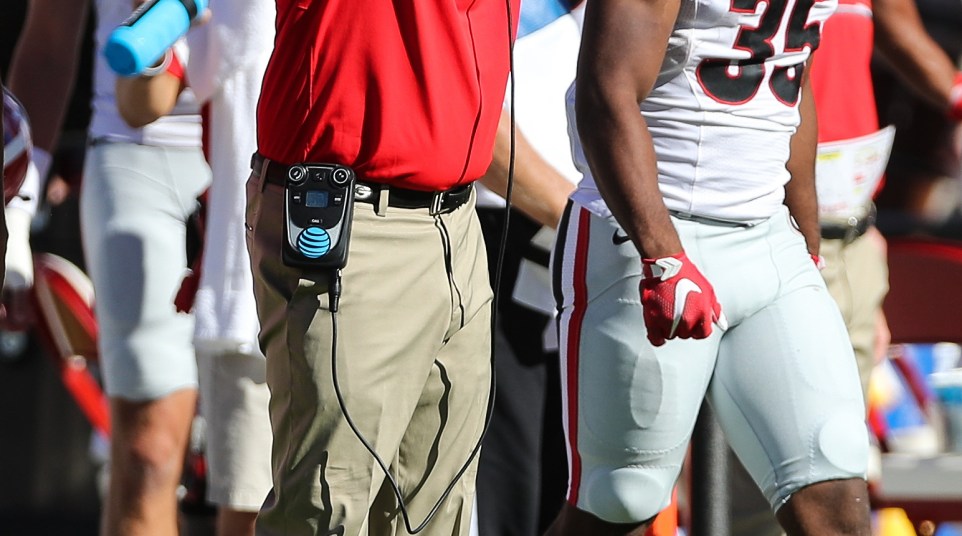
5 reasons Georgia fans should be concerned after loss to Vanderbilt
Georgia had avoided a couple of ugly losses in Kirby Smart’s first season, but that ended with the 17-16 loss to Vanderbilt on Saturday. There’s really no way to sugarcoat it; that was a bad loss for the Bulldogs.
It wasn’t heartbreaking, like the loss against Tennessee, but Georgia’s second home loss was more troubling. In yet another sloppy game, the Bulldogs allowed a lesser opponent to hang around and this time, it came back to haunt them.
Before moving forward, it’s important to note that this loss does not mean the sky is falling. This season is very much a learning process for a lot of Bulldogs, including their head coach and starting quarterback, but that’s what happens when a school cuts ties with a longtime head coach and hires someone has never held that job before.
Still, it’s getting to the point in the season where improvement should start being made and that hasn’t been the case for the Bulldogs.
Here are five reasons for concern after Georgia’s loss.
1. Predictable offensive game plan: It’s clear that Georgia wants to hand the ball off to its talented running backs as often as possible, but that’s not exactly a fully-realized offensive game plan. While it can be effective, as it was against South Carolina, the offense is just as likely to become too conservative and stall out.
Defenses are clearly looking for Georgia to run the ball, which is making the offensive line’s job harder and usually means the running backs are facing more defenders than they can deal with. Running on first and second downs has also left Jacob Eason with more long third downs than he should probably have, and he hasn’t succeeded often in those situations.
The Bulldogs had great success throwing the football against Vanderbilt, but they were determined not to abandon the run, despite averaging only 2.1 yards per carry.
Eason completed 12 of his 17 pass attempts on first down for 161 yards and a touchdown, compared to the Bulldogs’ 16 first-down runs, which resulted in only 36 yards. Vanderbilt wasn’t going to let Georgia run, but the Bulldogs didn’t do enough to adjust and take advantage.
Right now, this looks like an ultra-conservative offense, which didn’t appear to be the case a couple of weeks ago.
2. Special teams: This has been a major problem all season, but there has been no notable improvement. It could be argued that Georgia lost Saturday’s game on the opening kickoff, which Darrius Sims returned 95 yards to give Vanderbilt the ball at the 2-yard line. It led to a touchdown.
Smart has stressed that he places great importance on special teams, but there continue to be head-scratching decisions on punt returns and terrible lane integrity on kickoffs. Rodrigo Blankenship looked much better kicking field goals Saturday, and Marshall Long has been solid punting the ball all season, but there are way more negatives than positives.

Philip Williams-University of Georgia Athletics
Talent can play a role on special teams, but discipline and effort are usually the key components to success. Those qualities fall on the coaching staff, and it’s concerning that these mistakes continue to be made.
3. Smart’s game management: Most first-time head coaches struggle the most with in-game management, particularly late-game situations. Smart has been no exception. Against South Carolina, Smart failed to get the clock stopped after a penalty occurred late in the first half. This prevented an opportunity to kick a field goal or take a shot into the end zone.
Trailing Vanderbilt, Smart elected to punt the ball on a 4th-and-8 at the Vanderbilt 41-yard line with just over six minutes left. That’s not a horrible decision, as the Bulldogs did get the ball back, but the punt only netted 26 yards and the potential first down was much more valuable. On Georgia’s final offensive play, however, Smart used one of his two timeouts, which wasn’t the wisest decision, and then the Bulldogs ran a sweep with 175-pound Isaiah McKenzie on 4th-and-1.
4. Penalties: Before Vanderbilt ran one offensive play, Georgia had committed two penalties. The Bulldogs’ self-inflicted wounds have been a problem all season, which is surprising given that Smart came from a program that placed so much value on discipline.
Georgia entered Saturday’s game with 39 penalties, second-most in the SEC, and averaged 6.5 penalties per outing. Against Vanderbilt, the Bulldogs had another eight penalties.
New coaches usually like to show improvement in a team’s discipline, and penalties are an easy way to demonstrate that improvement. Georgia is a relatively young team so mental lapses are bound to happen, but there has been no discernible change as the season has progressed.
5. No killer instinct: Smart demands toughness, effort and physicality on every play. Some players have shown noticeable improvement, such as Trenton Thompson, Lorenzo Carter and Roquan Smith. That is a comforting sight, but the team as a whole has yet to take on their coach’s personality.
Too often Georgia has gone into autopilot when the opportunity to put the game away presents itself. The Bulldogs lost a 10-point lead to Nicholls State and nearly let a 12-point lead slip away in that one as well. Georgia led Tennessee 17-0 late in the second half, but allowed a score just before halftime.
Against South Carolina, Georgia never put the game out of reach, despite multiple chances to do so. This team isn’t talented enough to let opponents hang around and put them away when it matters most.
Georgia can’t afford to take series off, but that has been the case in nearly every game this season. That’s reflective of the Bulldogs’ attitude, which might be the biggest concern of all.
William McFadden covers the University of Georgia for Saturday Down South. For news on everything happening between the hedges, follow him on Twitter @willmcfadden.
